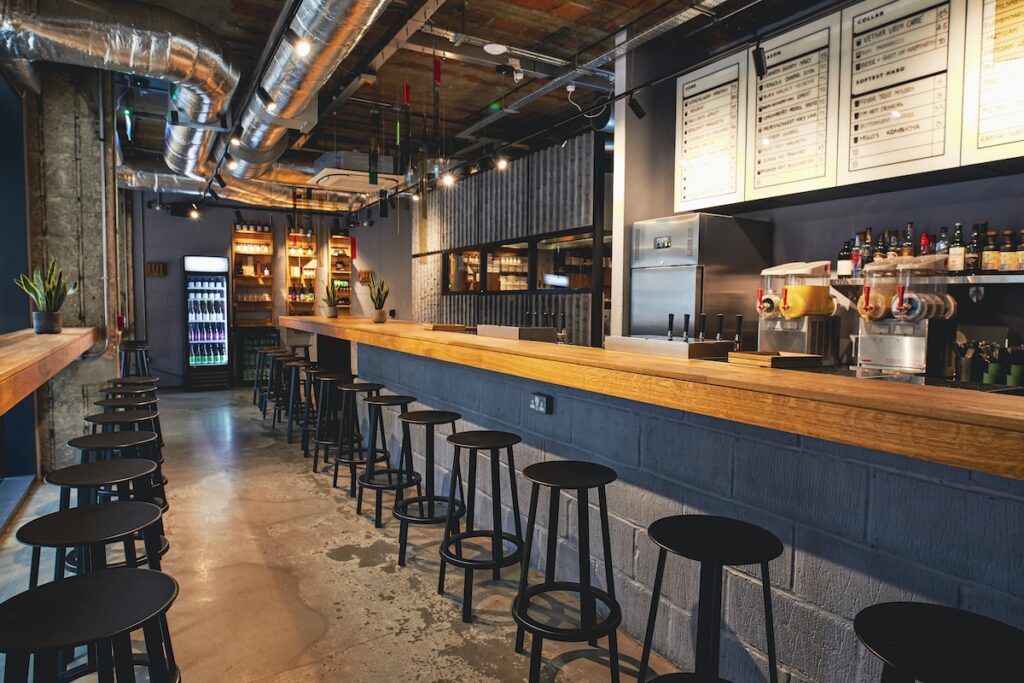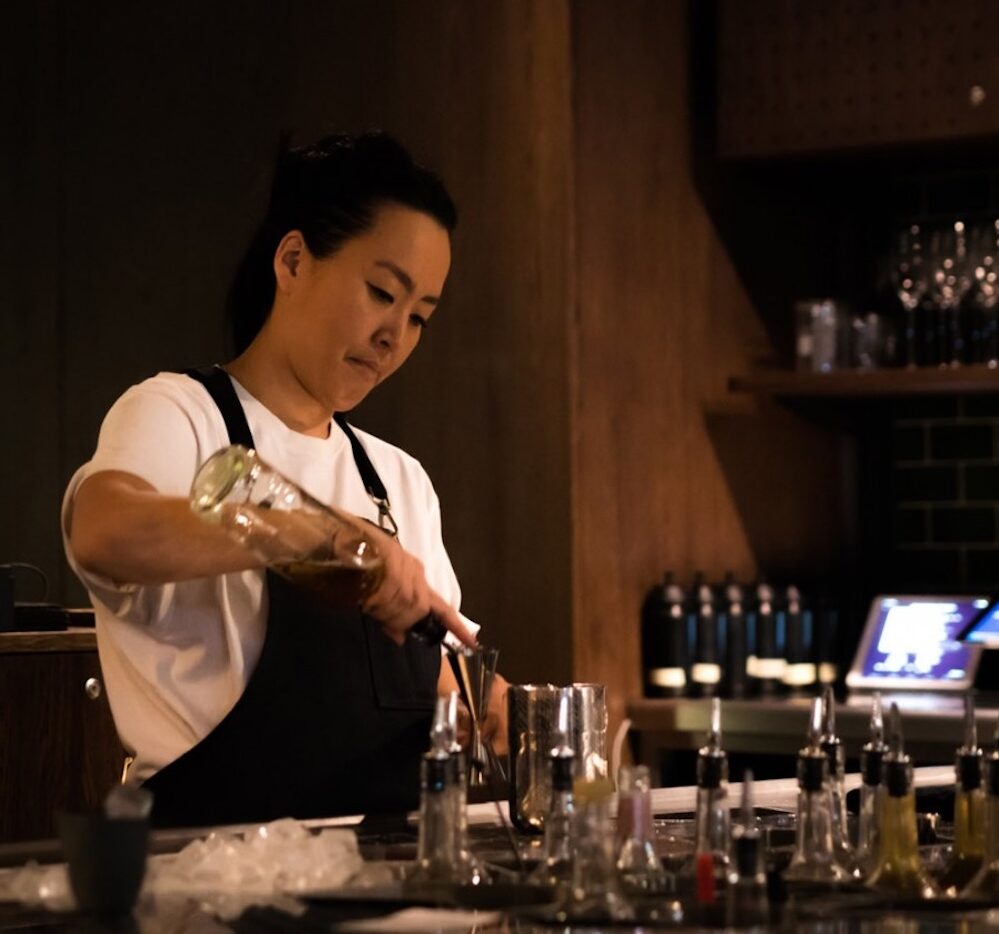Monica Berg began her career in hospitality at the young age of 15 in her hometown of Oslo. Decades later, she has become one of the most influential figures in the bar world. Monica has opened multiple bars, founded nonprofit organizations, and educated bartenders globally. Despite numerous accolades and successes, what fulfills her most is working behind the bar. You can find her at London’s Tayēr + Elementary, which she co-owns with her partner, Alex Kratena. I met Monica at the Campari Academy in Berlin during Bar Convent, where she shared her thoughts on the value of awards, her approach to community building, and the evolving bar industry.
You’ve received numerous accolades throughout your career, including being named the most influential person in the bar world. What do these awards mean to you?
I’m genuinely happy about the recognition, especially when it comes from my peers, then it’s meaningful. However, you must define what success means to you. If you’re chasing awards, you’re unlikely to find deep fulfillment in your work. Awards are a nice bonus, but they shouldn’t be your primary motivation. Life is about doing things that bring you happiness and serve a higher purpose. For me, that’s supporting my community in every way possible. I grew up with parents who emphasized the importance of being a “gangsmensken,” a Norwegian term for someone who is kind, humble, hardworking, and contributes to society. Community isn’t an ATM; you can’t just take and take. My ultimate goal is to be someone who gives, not just takes.
You’ve experienced the bar world from all angles – working in bars, educating bartenders, and founding nonprofit organizations. What do you think are the most significant changes in the industry in recent years?
One of the main changes is access to information. When I started bartending, I had to order specialized books from around the world to Oslo, which could take weeks. I’ve always loved learning, and I realized early on that happiness for me is closely tied to the opportunity to learn. Today, everything is available online instantly. While this abundance of information is great, it can also lead to gaps in practical knowledge. Many bartenders lack direct access to experienced mentors. Generational gaps in the industry, exacerbated by the pandemic, have made it harder for some bartenders to gain foundational skills. There’s also a shortage of experienced bartenders behind the bar. I’m part of the older generation and still work in service because it brings me joy. When Tayēr is open, I’m there unless I’m unwell. It energizes me to see people happy in our bar. If someone comes in having had a bad day, it’s a challenge for me to turn it around so they leave in a better mood. Making people happy is my greatest reward.

How do you unwind, given your busy schedule of bartending, traveling, and educating?
I enjoy physical activities like going to the gym or running. But honestly, I just love working. Bartending energizes me the most. I know I should probably slow down at some point, but it’s hard. Even on bad days, when Tayēr opens at 6 PM, I’m excited to get behind the bar because I know it will make me feel better. Meeting kind people and connecting with them is uplifting. That’s why I don’t understand people who don’t enjoy working behind the bar.
Why do you think some people are hesitant to work behind the bar?
Many experienced bartenders have moved into brand work or management roles. Others have left the industry entirely. For women, balancing family life with night shifts can be particularly challenging. Additionally, the industry itself has changed. People’s drinking habits, especially post-pandemic, have shifted. Nighttime activity has decreased, and bars have had to adapt. People go out earlier and leave earlier. Tuesdays are the new Thursdays, and Thursdays are the new Fridays. Weekends, in some areas, are quieter than before. Nightclubs, not just in London but globally, are struggling because people simply don’t go to them as much anymore.
Speaking of changes, what’s your take on the trend of younger people drinking less and the rise of low- and no-alcohol options?
It’s a complex issue that can’t be answered in a few sentences. Spending time out in venues has become more expensive, and people are finding other ways to enjoy their evenings. Additionally, there’s a growing awareness of consumption habits. It’s now common for guests to mix regular cocktails with non-alcoholic options or stick to non-alcoholic drinks entirely.

What do you find most challenging about running a bar business today?
Running any business comes with challenges, especially when so many factors are beyond your control. One major issue is that our industry is often misunderstood by society. During the pandemic, bars and restaurants were closed to create an illusion of control, even though it’s now proven that most transmission occurred elsewhere. Our industry has suffered immensely in recent years, revealing how underrepresented hospitality professionals are in decision-making processes. We need to change this and ensure we have a seat at the table when policies that affect our livelihoods are discussed.
Can you tell us about your role at Campari Academy and how it has evolved since you joined?
Campari Academy has been around for quite a few years, initially operating as local academies. The first one in Italy has been running for over a decade. I joined nearly four years ago when we created the global Campari Academy. Our goal is to provide bartenders with relevant, practical education. The bar industry has evolved rapidly, especially in the last decade, so our role is to make education accessible and create spaces for bartenders to learn from each other and expand their horizons. If bartenders aren’t part of the conversation, the education might not be relevant to them.
Is there a high demand for online bartender education? What’s its future?
Yes, there’s demand, but the quality of content needs to improve. Repeating the same material in the same ways can make it less engaging. Bartenders want to grow and evolve, so when content is captivating, relevant, and high-quality, there’s always interest. We focus on delivering knowledge that bartenders can’t easily find elsewhere.
How is Campari Academy different?
Campari Academy connects young bartenders with experienced professionals. I’ve also learned a lot, as I’ve never worked for a large corporation before. We aim to provide bartenders with information they might not get from books. Many bartenders can’t travel often but want to understand how their peers work across the globe. We teach practical skills, like key details to remember during service or what to consider when starting your own business or brand. We focus on valuable, in-depth knowledge for hospitality professionals.
What are you looking forward to in the near future?
I’m excited about the holiday season. Our bar team has various traditions, and then we close for three weeks during Christmas. I’ll be heading to Mexico to relax on the beach, which truly recharges me. Despite the current challenges in our industry, I’m hopeful things will improve. Everything is part of a cycle, and I believe better days are ahead of us.




